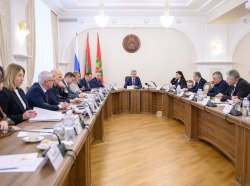The scientific seminar International Investment Relations was attended by representatives of the Presidential Execution Office, Ministry of Economic Development, Ministry of Agriculture and Natural Resources, State Customs Committee, Chamber of Trade and Industry, Pridnestrovian Republican and Ipotechniy Bank. On behalf of the acting prime minister, Maya Parnas, the welcome address to the forum participants was read out by the Alevtina Slinchenko, minister of economic development.
«The seminar is an excellent opportunity to obtain knowledge and share experience," underscored the premier in her address. She highlighted the fact that attraction of investments must contribute to «the revival of manufacturing potential and enhancement of living standards.»
In her speech Alevtina Slinchenko noted that Pridnestrovie's current law is aimed at creating a favourable investment climate. Among the legal acts promoting this are laws «On investment activities», «On foreign investments», «On innovation activities».
The issue of attracting foreign capital to the Pridnestrovian Moldavian Republic was considered in the report by Inna Vataman, PhD, associate professor at Finances and Credit Chair. Speaking about the Pridnestrovian legislation favouring foreign investments, she underscored that the progressive scale of income tax benefits is in effect in Pridnestrovie. And benefits depend on the amount of investment. For example, those who have invested from $10,000 to 250,000 will enjoy a 10% income tax benefit. There are also 30% benefits and even higher. It depends on the amount of investments. There are also a number of customs preferences.
Besides legal acts, Inna Vataman also noted the subordinate acts that must create additional incentive to foreign capital inflow to Pridnestrovie, among which is the governmental decree on establishment of free economic zones. There are currently five such zones in Pridnestrovie: villages of Kremenchug, Giska, Korzhevo and Bendery's district Severny. There are plans to create tourist and recreational free economic zones and introduce tax preferences for legal entities engaged in non-production activities, for example, IT companies.
Among the factors contributing to Pridnestrovie’s attraction to potential investors are, according to Inna Vataman, favourable climatic conditions and geographic position of Pridnestrovie. The negative aspects include Pridnestrovie's non-recognised status, negative balance in foreign trade transactions and the difference of the Pridnestrovian tax system from the classic one employed by the absolute majority of countries. It is recalled that not once did the president and the government submit draft laws providing for the adoption of the classic tax system to the Supreme Council for consideration, but they were all rejected. There is currently a Tax Code draft before the parliament, but it cannot be considered as deputies have not been able to muster the quorum since mid-September.
A part of Inna Vataman's report was dedicated to the three investment forums that had taken place in Pridnestroive. According to her, if 50 potential investors from 13 countries took part in the first forum, 70 investors from 18 countries in the second, the third forum saw 82 investors form over 20 countries. Following the 3rd Pridnestrovian Investment Forum 23 agreements were signed, six of which have already been put into practice. The total amount of investments in the six already implemented projects is $5.2 million. Today, as Inna Vataman emphasised, a Russo-Pridnestrovian investment and economic development group is being formed. The group aims at developing measures to minimise crisis phenomena in economy and monitoring offshore transactions.
Despite its non-recognised status, Pridnestrovie is subject to global investment trends. They were covered in the reports by lecturer Alla Yesir and Lyudmila Safronova, PhD, associate professor at Finances and Credits Chair.
This was one of the four seminars hold by all chairs of Shevchnko Pridnestrovian State University. The seminar in question was organised by the Finances and Credits Chair.








